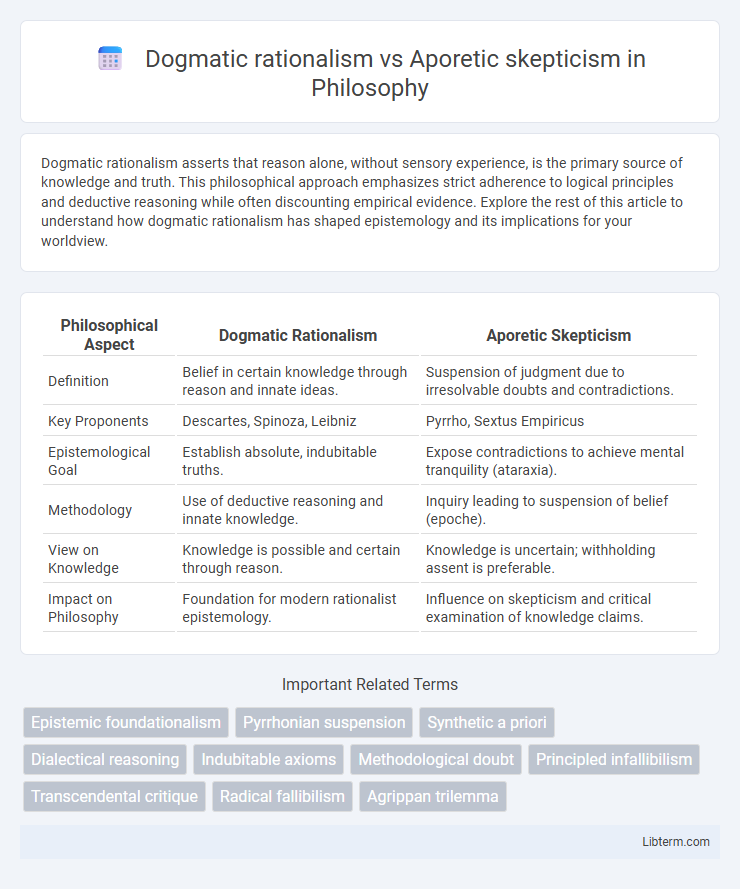Dogmatic rationalism asserts that reason alone, without sensory experience, is the primary source of knowledge and truth. This philosophical approach emphasizes strict adherence to logical principles and deductive reasoning while often discounting empirical evidence. Explore the rest of this article to understand how dogmatic rationalism has shaped epistemology and its implications for your worldview.
Table of Comparison
| Philosophical Aspect | Dogmatic Rationalism | Aporetic Skepticism |
|---|---|---|
| Definition | Belief in certain knowledge through reason and innate ideas. | Suspension of judgment due to irresolvable doubts and contradictions. |
| Key Proponents | Descartes, Spinoza, Leibniz | Pyrrho, Sextus Empiricus |
| Epistemological Goal | Establish absolute, indubitable truths. | Expose contradictions to achieve mental tranquility (ataraxia). |
| Methodology | Use of deductive reasoning and innate knowledge. | Inquiry leading to suspension of belief (epoche). |
| View on Knowledge | Knowledge is possible and certain through reason. | Knowledge is uncertain; withholding assent is preferable. |
| Impact on Philosophy | Foundation for modern rationalist epistemology. | Influence on skepticism and critical examination of knowledge claims. |
Defining Dogmatic Rationalism
Dogmatic rationalism asserts that certain foundational truths can be known with certainty through reason alone, emphasizing the existence of clear and distinct ideas as the basis for knowledge. This philosophical stance holds that reason is the primary source of knowledge, often prioritizing innate ideas or deductive logic over empirical evidence. Distinguished from aporetic skepticism, dogmatic rationalism confidently claims the possibility of definitive knowledge despite potential challenges or doubts.
Understanding Aporetic Skepticism
Aporetic skepticism centers on suspending judgment due to the recognition of persistent, irresolvable contradictions within knowledge claims, promoting intellectual humility and open inquiry. Unlike dogmatic rationalism, which asserts definitive truths based on reason, aporetic skepticism emphasizes the limits of human understanding and the importance of doubt in philosophical exploration. This approach encourages continuous questioning and refrains from dogmatic adherence to any single epistemological position.
Historical Origins and Key Proponents
Dogmatic rationalism originated in the early modern period with philosophers such as Rene Descartes, who emphasized the certainty of knowledge derived from reason and innate ideas, rejecting skepticism. Aporetic skepticism traces its roots to ancient Greek philosophy, notably Pyrrho of Elis and Sextus Empiricus, who questioned the possibility of certain knowledge, advocating for suspension of judgment (epoche). The historical tension between these schools reflects contrasting approaches to epistemology: dogmatic rationalists seek definitive truths, while aporetic skeptics highlight persistent doubts and unresolved philosophical puzzles.
Core Principles of Dogmatic Rationalism
Dogmatic rationalism asserts that certain knowledge can be attained through reason alone, emphasizing the existence of innate ideas and deductive certainty. It maintains that reason provides definitive answers to metaphysical and epistemological questions without reliance on empirical evidence. This core principle contrasts sharply with aporetic skepticism, which questions the possibility of achieving absolute knowledge.
Fundamental Tenets of Aporetic Skepticism
Aporetic skepticism centers on the fundamental tenet that certain knowledge is inherently unattainable, leading to a state of suspension of judgment (epoche) regarding epistemic claims. This philosophical stance emphasizes continuous inquiry and doubts the possibility of definitive answers, contrasting with dogmatic rationalism's assertion of certain knowledge through reason. Aporetic skeptics maintain that by recognizing the limits of human reason, one can achieve mental tranquility (ataraxia) through withholding assent from conflicting beliefs.
Epistemological Contrasts Between the Two
Dogmatic rationalism asserts knowledge is attainable through reason and innate ideas, emphasizing certainty and systematic structure in epistemology. Aporetic skepticism, by contrast, embraces persistent doubt and the suspension of belief, highlighting epistemic limits and unresolved contradictions. This fundamental epistemological contrast centers on the certainty of knowledge versus the acceptance of epistemic uncertainty.
Impact on Philosophical Thought and Discourse
Dogmatic rationalism, emphasizing the certainty of reason and fixed truths, fundamentally shaped epistemology by asserting that knowledge derives from innate ideas and logical deduction, thus encouraging systematic philosophical frameworks. Aporetic skepticism, by contrast, challenges the possibility of absolute knowledge through persistent questioning and doubt, fostering critical inquiry and driving philosophers to reevaluate assumptions and methodological foundations. The interplay between these approaches catalyzed profound developments in modern philosophy, influencing debates on knowledge, belief, and the limits of human understanding.
Relevance to Modern Debates in Philosophy
Dogmatic rationalism asserts that certain knowledge can be attained through reason alone, grounding beliefs in self-evident truths or axioms, which influences contemporary epistemological debates about foundationalism and the limits of human cognition. Aporetic skepticism, by emphasizing persistent doubt and the unresolved nature of key philosophical questions, contributes to modern discussions on epistemic humility and the challenges of certainty in knowledge claims. Both positions shape ongoing dialogues in philosophy regarding the balance between justified belief and critical inquiry in the pursuit of truth.
Strengths and Weaknesses of Each Approach
Dogmatic rationalism emphasizes certainty through reason, providing clear, structured knowledge but risks dogmatism by dismissing alternative viewpoints without sufficient scrutiny. Aporetic skepticism fosters critical thinking and open inquiry by consistently questioning assumptions, yet it may lead to indecision or paralysis from excessive doubt. Balancing these approaches can enhance philosophical inquiry by combining rational clarity with critical openness.
Synthesizing Rationalism and Skepticism
Synthesizing rationalism and skepticism involves integrating the dogmatic trust in reason's capacity to attain knowledge with the aporetic stance that questions the certainty of such knowledge. This approach emphasizes a balanced inquiry that acknowledges reason's strengths in structuring understanding while maintaining a critical openness to doubt and revision. By combining the systematic methodologies of rationalism with the reflective suspension of judgment found in skepticism, this synthesis fosters a dynamic epistemology suited for navigating complex philosophical problems.
Dogmatic rationalism Infographic

 libterm.com
libterm.com